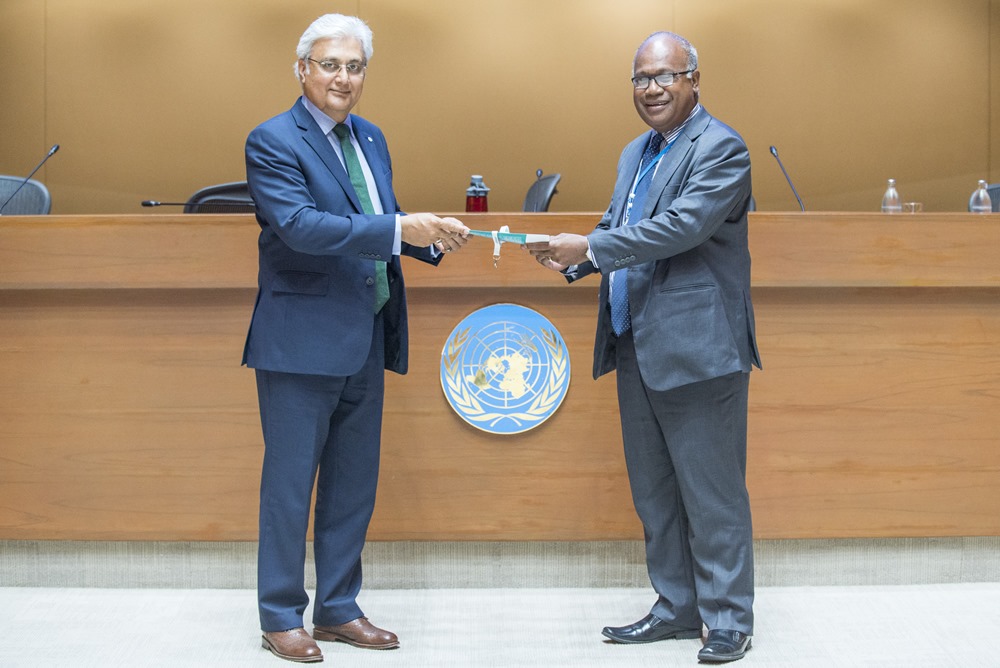MSG Climate Finance Strategy Declared first in the world to Implement COP23 Mandate

Mr. Ovais Sarmad, UNFCCC Deputy Executive Secretary hands the MSG Climate Finance Strategy to Director General Ambassador Amena Yauvoli on Friday. PHOTO CREDIT: UNFCCC
12 September 2019
The MSG Climate Finance Strategy has been described as the first needs-based Climate Finance Strategy to be developed leading the example following the mandate given by COP23 to the United Nations Framework Convention of Climate Change (UNFCCC). The comments were made during the recent Asia Pacific Climate Week (APCW) in Bangkok, Thailand by Mr. Ovais Sarmad, Deputy Executive Secretary of the UNFCCC.
Following the COP23 mandate, the UNFCCC Secretariat has been developing the Needs-based Finance (NBF) Project aimed at facilitating and mobilizing climate finance to support the needs identified by developing countries regarding the implementation of priority mitigation and adaptation actions, in accordance with the goals outlined in their nationally determined contributions (NDCs), national adaptation plans (NAPs) and other relevant policies or strategies.
The needs based Finance (NBF) project aims at promoting and utilizing alliances with other mandates and processes under the UNFCCC and the Paris Agreement making it possible to build on and also complement existing climate finance related work of others in partner countries to build collaborations and avoid duplicating efforts.
This country-driven project focuses on several pilot partner countries in the regions of Latin America and the Caribbean, Africa, Asia and the Pacific, and the Melanesian Sub Region, giving the MSG Secretariat the honour of being the first to have completed a Climate Finance Strategy.
On Thursday 05 September 2019 the MSG Secretariat Director General Ambassador Amena Yauvoli was formally handed the MSG Climate Finance Strategy by Mr. Ovais Sarmad Deputy Executive Secretary of the UNFCCC in a ceremony during a high level Partners Dialogue, at the UNESCAP Headquarters in Bangkok, Thailand.
During the handing over ceremony, Mr. Sarmad conveyed his appreciation of the cordial working relationship that UNFCCC has forged with the MSG Secretariat subsequently resulting in the development of the first ever sub-regional and comprehensive climate finance strategy paper. Deputy Executive Secretary Mr. Sarmad, paid particular respect to the leadership of Ambassador Amena Yauvoli, who is also a respected person in the global climate change movement.
Furthermore, the UNFCCC Deputy Executive Secretary said he was confident with the MSG Climate Finance Strategy and will, without a doubt, elevate MSG Members’ climate finance goals to the forefront for donors/partners to directly work with each MSG Member country. “This now gives prospective donors an insight into what national priorities financially need to be addressed regarding the impacts of climate change from adaptation to mitigation, to means of implementation and beyond and more importantly that these needs based finance activities respond to international standards”, said Mr. Sarmad.
In response, Director General Ambassador Yauvoli said that the MSG Climate Finance Strategy is a product of the combined cooperation and sharing of ideas between environment and finance officials from MSG Member countries. “After numerous consultations with national experts from four of the MSG states and regional partners namely UNDP, GIZ, PIFS, SPC, and SPREP over the past 13 months, six key strategic areas and actions have been identified. Furthermore, the MSG countries have put together a list of project ideas and concepts to develop project pipelines that will be used as a basis for reaching out to partner organizations and prospective partners for implementation.”
He said, like other small Islands States, the MSG also have common challenges and issues of interest in dealing with and accessing Climate Finance, which are at different phases and levels in, based on each member countries mitigation and adaptation priorities, as contained in their current NDCs. The question posed to our Members during the panel is whether the individual and aggregate NDCs of MSG Member countries are sufficiently robust to leverage finance to the agreed meet climate goals in the NDCs.
Ambassador Yauvoli said that under the Climate Change Needs-based Finance which is a mandate of COP23, the goal of the MSG is to ensure that climate finance can be effectively accessed, mobilised and scaled up to contribute to achieving climate goals in the Melanesian sub- region.
“Our Objective is to make scaling up of climate finance predictable, clear and providing opportunities for attracting climate friendly investments in the Melanesian sub-region” says Ambassador Yauvoli. “It also includes better alignment of climate mitigation and adaptation plans, National Development Plans, International Development Plans and Budgetary Processes” he said.
He expressed that there had been wider stakeholder collaboration and partnership exceptionally undertaken through in the process of formulating the strategy both at national and sub-regional levels.
In terms of lessons learnt during the formulation phase, the Director General said there had been a number of lessons learnt during the formulation of these MSG Climate Finance Strategy, firstly, was the understanding of our Members’ assessed needs and the challenges they face in accessing predictable and Green climate finance, especially the gaps and capacity issues that each Member has.
Secondly was the continuous engagement of our partners and stakeholders in the formulation process. This engagement is very important even in the next implementation phase of the strategy, especially our engagements with the Civil Society Organizations (CSO’s) and the Non-Government Organizations (NGOs).
Thirdly, we have to provide a clear time frame for the strategy. In the MSG Climate Finance Strategy, its time frame is 3 years 2019 – 2021. The reasons being to reflect the constantly changing landscape of the climate finance both International and national to meet the needs of our members and also for monitoring and evaluation and review of the strategy and its performance in a three-year cycle.
Finally, our political leaders need to own this strategy, hence their endorsement is very crucial and we are hoping to get this MSG Climate Finance Strategy endorsed during our next MSG Leaders’ Summit earlier on the year.
As the first to have a Climate Finance Strategy, the MSG Secretariat have also expressed willingness to assist and share the experience with other small island states regions, like the Indian Ocean Islands States, the Caribbean, Latin America and others in the formulation of their needs-based climate finance strategy.
Lastly, the Director General also conveyed his heartfelt gratitude to Mr. Yolando Valesco, UNFCCC’s Manager Climate Finance Sub-Programme and his team in Bonn, Germany for the excellent backstopping support services they have provided to the MSG Secretariat, including technical assistance, during the past 13 months helping make the formulation of the Strategy possible. The next phase now begins the implementation of the Strategy.
